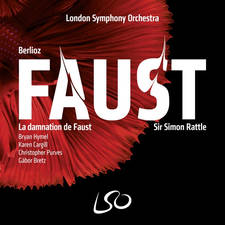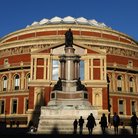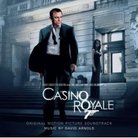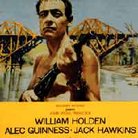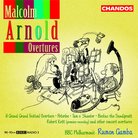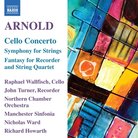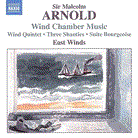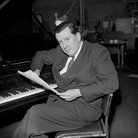Malcolm Arnold: A Life
Malcolm Arnold fought against alcoholism, mental illness and the music establishment to create an eclectic body of work that embodied his unique artistic vision.
“Music is a social act of communication among people, a gesture of friendship, the strongest there is.” So saying, Malcolm Arnold firmly nailed his creative colours to the mast. Whether in the pungent immediacy of his Cornish Dances, the patriotic bluster of The Bridge on the River Kwai, or the painfully introspective musing of his Guitar Concerto’s slow movement, Arnold had an emotional openness and sincerity rare in composers of his generation.
Like Dmitri Shostakovich, whom he met and befriended at a conference in 1957, Arnold produced a series of symphonies whose bracing eclecticism was central to his artistic vision. He also shared with Shostakovich a profound gift for film music, an increasing obsession with human frailty and death, and a delight in juxtaposing musical opposites, often to devastating effect.
For much of his life, Arnold was deeply unpopular with the British classical music establishment, whose modernist pretensions were ill-equipped to deal with the knockabout antics of his comedy overture, Beckus The Dandipratt. Still worse, musicians actually enjoyed playing Arnold’s brilliantly written, mellifluously scored music – and audiences lapped it up.
Arnold’s 500-plus compositions include 132 film scores, nine symphonies, seven ballets, two operas, 20 concertos, a considerable quantity of chamber music, and various works for wind and brass instruments. Given the extent of his musical achievements, it is remarkable that he was never accorded a distinguished place alongside the mainstream British talents of Britten, Tippett and Walton (the latter with whom he collaborated and became close friends).
The neglect that he suffered at times undoubtedly contributed to a life punctuated by mental collapse, alcoholism, bouts of irascible behaviour and attempted suicides. Yet he remained a lovable and generous man at heart, one who thankfully lived long enough to enjoy the critical reappraisal and acclaim that his music received during the last decade of his life.
Arnold was born into a musical Northampton family of shoe-makers. He loathed school and ended up being privately tutored at home, but rapidly discovered the delights of music through the violin, piano and organ. Inspired by his love of jazz, and Louis Armstrong in particular, Arnold took up the trumpet and, aged 16, won a scholarship to study at London’s Royal College of Music. He made his concert debut playing Bach’s Brandenburg Concerto No.2 on an authentic trumpet, or as he called it “a gas pipe”.
By this time Arnold was already composing fluently, but it was as a trumpeter that he launched his professional career; during the second year of his training he was appointed third trumpet of the London Philharmonic Orchestra, quickly rising to principal.
In 1943, he put aside his pacifist convictions and joined the army, a move that compounded his natural aversion to authoritarianism. After taking as much as he could stand (two years), in desperation he shot himself in the foot and was discharged. For a short while he played second trumpet in the BBC Symphony Orchestra, but then returned to the LPO where he stayed until 1948 when he won the Royal Academy of Music’s Mendelssohn Scholarship, which enabled him to study composition in Italy. By then he had composed around 20 concert works including Beckus the Dandipratt, which featured Arnold himself on the premiere LPO recording.
Over the next 12 years Arnold produced a stream of well-crafted and inventive scores. In 1949, he composed the first of his nine symphonies, synthesising a Sibelian splendour with a Mahlerian delight in irony.
Four years later the Second Symphony made such an impact that it enjoyed a number of international performances. Meanwhile, his two sets of English Dances (1951) proved enormously popular, and in 1952 he composed the music to the first of three films for director David Lean: The Sound Barrier. Hobson’s Choice followed in 1953 and The Bridge On The River Kwai four years later.
Arnold was by now deluged with commissions. His seemingly unending gift for melody, acute ear for instrumental sonority, and ability to work with fearsome accuracy at high speed, made him the toast of the younger generation of composers for a brief spell. He also began conducting and recording his own music with no small amount of success. The musical world, it seemed, lay at his feet. Yet behind the scenes the problems that would later escalate to almost overwhelm him were already brewing.
Developing a heightened taste for wine and women is hardly unusual among newfound celebrities. But in Arnold’s case, the champagne lifestyle combined with his existing mental health problems to produce a hurtling pendulum of extreme mood swings. All of this is painfully reflected in the staggering emotional range of his music during this period.
It beggars belief that the same man who bared his creative soul in the musical melting-pot of the Fifth Symphony (1961), was behind the raspberry-blowing send-ups of The Belles Ff St. Trinian’s (1954) and the anarchic A Grand, Grand Overture for organ, three vacuum cleaners, floor polisher, four rifles and orchestra (1956), written for the mad-cap genius, artist and musician Gerard Hoffnung.
Desperate to escape the outer turmoil of swinging London and the inner turmoil of his own demons, Arnold set up home in the West Country at St Merryn on the north coast of Cornwall. His struggles with alcohol and manic depression continued unabated, yet he fulfilled a series of wide-ranging commissions, including pieces for violinist Yehudi Menuhin and guitarist Julian Bream, and the Peterloo Overture for the TUC’s centenary in 1968.
Most famous of all from this period are the set of four Cornish Dances (1966) and The Padstow Lifeboat (1968). In honour of the impact Arnold had on the musical life of the peninsula, he was made a Bard Of The Cornish Gorseth in 1969 – the year that Arnold conducted the premiere of the Concerto For Group And Orchestra by rock group Deep Purple’s Jon Lord. A CBE followed in 1970.
In the 1970s there was a gradual downturn in Arnold’s health, which a move to Ireland in 1972 did little to abate. Things came to a head in 1975 when – largely because of his unpredictable personality and leftist political views – he was passed over as Master Of The Queen’s Music following the death of Arthur Bliss (the honour went instead to Malcolm Williamson).
Arnold’s second marriage then ended in divorce and, not for the first time, he attempted suicide. Hardly surprisingly, his easy flow of invention slowed to a trickle. In 1978, he returned to England and the following year checked himself into a private specialist hospital in an attempt to conquer his mental illness and alcoholism.
Given his unquestionable status as one of England’s greatest living composers, what happened next is particularly poignant. In 1983, he left hospital and was given a room by his social worker at the pub where she lived. However, she died the following year and Arnold was left literally out on the streets. If it hadn’t been for a passer-by recognising him and informing the BBC of his plight, there’s no telling what might have happened. By a fortunate chain of events, Arnold soon found himself living in Norfolk, permanently cared for and managed by Anthony Day.
Happily, Arnold began composing again and, in 1986, completed what was intended to be his farewell work – the Ninth Symphony. However, he hadn’t reckoned for a spate of commissions from distinguished admirers and friends that resulted in another dozen pieces written for the likes of cellist Julian Lloyd Webber, flautist James Galway and recorder virtuoso Michaela Petri. Feeling creatively “burnt-out”, he retired from composing in 1990.
Remarkably, this seemed to light the touchpaper of interest in Arnold’s music in a way it hadn’t enjoyed since its 1950s heyday. The Ninth Symphony received its world premiere in 1992; the following year he officially became “Sir Malcolm” and record companies began releasing CDs of his music in unprecedented quantities.
His 80th birthday in 2001 was marked by a string of concerts both in Britain and abroad, which inspired two major biographies and Tony Palmer’s remarkable documentary film.
Sadly, Arnold passed away on September 23, 2006, just a few weeks short of his 85th birthday. He could have wished for no more devoted and fitting musical commemoration than the many concerts and events originally planned in celebration.
The Essential Collection
For the complete picture
Eight English Dances, Opp.31 & 33 (1950/1951)
Bournemouth Symphony Orchestra/Charles Groves For many listeners, the quintessential Arnold is contained in his indelible sets of English, Cornish, Scottish, Irish and Welsh dances. Yet if it hadn’t been for a suggestion from a publisher friend that he might like to write something along the lines of Dvorˇák’s Slavonic Dances we would have been denied some of the most delectable miniatures in the British music tradition. EMI 574 7802
For symphonic mastery
Symphony No.5 (1961)
London Symphony Orchestra/Hickox The Fifth Symphony marks the period in Arnold’s life when he was bursting with so many ideas in contrasting idioms that it took a symphony to fuse them together. En route, he pays musical tributes to departed friends.
Chandos CHAN 9385
For colour and spectacle
The Bridge on the River Kwai (1957)
Director David Lean, Producer Sam Spiegel
This two-disc special edition DVD of the classic film, for which Arnold received an Oscar, isolates the music so that you can appreciate his colossal achievement in producing the score in just 10 days.
Sony Entertainment CDR 10001
For dry-eyed humour
Padstow Lifeboat, Op.94 (1968)
Grimethorpe Colliery Band/Arnold Arnold composed this Cornish brass-band standard march as a tribute to the crews of the RNLI lifeboat station at Padstow, to mark the occasion of the building of a new lifeboat house and slipway.
RCA 74321 88392-2
